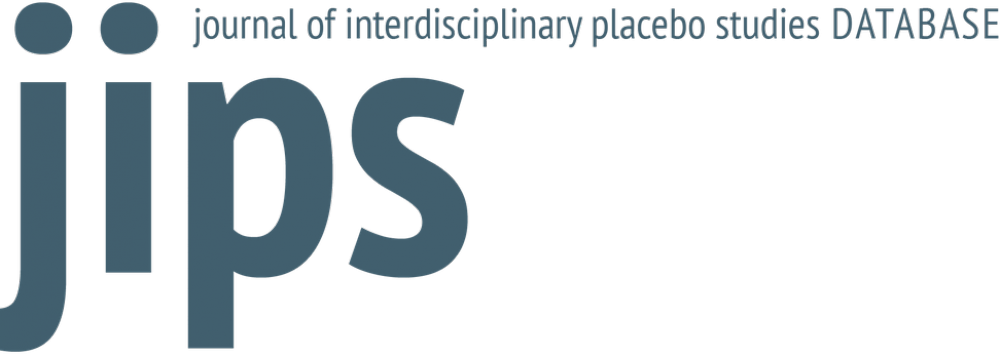Today we present 19 new placebo research papers, comments and abstracts identified during March 2018. As usual, they are based on new PUBMED publication using the search terms „placebo“ and „nocebo“ and are hand-selected from more than 761 new publications during the preceding month. Previously published monthly updates can be found in our archive. Todays selection as well as all previously identified papers will also go into our placebo research library that currently contains more than 3,500 relevant papers. If you would like to get access to the full database, please register for our newsletter and provide us with your email address and affiliation.
Barbagallo, G., Nistico, R., Vescio, B., Cerasa, A., Olivadese, G., Nigro, S., Crasà, M., Quattrone, A., Bianco, M.G., Morelli, M., Augimeri, A., Salsone, M., Novellino, F., Nicoletti, G., Arabia, G., Quattrone, A. (2018).
The placebo effect on resting tremor in Parkinson’s disease: an electrophysiological study. Parkinsonism Relat Disord. doi:10.1016/j.parkreldis.2018.03.012
https://www.ncbi.nlm.nih.gov/pubmed/29551396
Beasley, M. J., Ferguson-Jones, E. A., & Macfarlane, G. J. (2017).
Treatment expectations but not preference affect outcome in a trial of CBT and exercise for pain. Can J Pain, 1(1), 161-170. doi:10.1080/24740527.2017.1384297
https://www.ncbi.nlm.nih.gov/pubmed/29521378
Cheah, P. Y., Steinkamp, N., von Seidlein, L., & Price, R. N. (2018).
The ethics of using placebo in randomised controlled trials: a case study of a Plasmodium vivax antirelapse trial. BMC Med Ethics, 19(1), 19. doi:10.1186/s12910-018-0259-4
https://www.ncbi.nlm.nih.gov/pubmed/29510711
Daguet, I., Bergeron-Vezina, K., Harvey, M. P., Martel, M., & Leonard, G. (2018).
Transcutaneous electrical nerve stimulation and placebo analgesia: is the effect the same for young and older individuals? Clin Interv Aging, 13, 335-342. doi:10.2147/CIA.S152906
https://www.ncbi.nlm.nih.gov/pubmed/29535508
El Brihi, J., Horne, R., & Faasse, K. (2018).
Prescribing Placebos: An Experimental Examination of the Role of Dose, Expectancies, and
Adherence in Open-Label Placebo Effects. Ann Behav Med. doi:10.1093/abm/kay011
https://www.ncbi.nlm.nih.gov/pubmed/29547962
Frame, L. A., Fischer, J. P., Geller, G., & Cheskin, L. J. (2018).
Use of Placebo in Supplementation Studies-Vitamin D Research Illustrates an Ethical Quandary. Nutrients, 10(3). doi:10.3390/nu10030347
https://www.ncbi.nlm.nih.gov/pubmed/29533982
Grahl, A., Onat, S., & Buchel, C. (2018).
The periaqueductal gray and Bayesian integration in placebo analgesia. Elife, 7. doi:10.7554/eLife.32930
https://www.ncbi.nlm.nih.gov/pubmed/29555019
Haug-Baltzell, A., Bhangale, T. R., Chang, D., Dressen, A., Yaspan, B. L., Ortmann, W., Brauer, M.J., Hunkapiller, J., Reeder, J., Mukhyala, K., Cuenco, K.T., Tom, J.A., Cowgill, A., Vogel, J., Forrest, W.F., Behrens, T.W., Graham, R.R., Wuster, A. (2018).
Previously reported placebo-response-associated variants do not predict patient outcomes in inflammatory disease Phase III trial placebo arms. Genes Immun. doi:10.1038/s41435-018-0018-z
https://www.ncbi.nlm.nih.gov/pubmed/29550837
Hodgins, G. E., Blommel, J. G., Dunlop, B. W., Iosifescu, D., Mathew, S. J., Neylan, T. C., Mayberg, H. S., Harvey, P. D. (2018).
Placebo Effects Across Self-Report, Clinician Rating, and Objective Performance Tasks Among Women With Post-Traumatic Stress Disorder: Investigation of Placebo Response in a Pharmacological Treatment Study of Post-Traumatic Stress Disorder. J Clin Psychopharmacol. doi:10.1097/JCP.0000000000000858
https://www.ncbi.nlm.nih.gov/pubmed/29505471
Lee, Y. S., & Chae, Y. (2018).
Powerful effects of placebo needles. Acupunct Med. doi:10.1136/acupmed-2017-011516
https://www.ncbi.nlm.nih.gov/pubmed/29567666
Louw, A., Diener, I., Fernandez-de-Las-Penas, C., & Puentedura, E. J. (2017).
Sham Surgery in Orthopedics: A Systematic Review of the Literature. Pain Med, 18(4), 736-750. doi:10.1093/pm/pnw164
https://www.ncbi.nlm.nih.gov/pubmed/27402957
Mak, D. N., Au, I. P., Chan, M., Chan, Z. Y., An, W. W., Zhang, J. H., Draper, D.. Cheung, R. T. (2018).
Placebo effect of facilitatory Kinesio tape on muscle activity and muscle strength. Physiother Theory Pract, 1-6. doi:10.1080/09593985.2018.1441936
https://www.ncbi.nlm.nih.gov/pubmed/29461139
Mouly, S., Bergmann, J. F., & Molimard, M. (2018).
[The nocebo effect: Various aspects and consequences in clinical practice]. Rev Med Interne. doi:10.1016/j.revmed.2018.02.021
https://www.ncbi.nlm.nih.gov/pubmed/29576197
Schaefer, M., Sahin, T., & Berstecher, B. (2018).
Why do open-label placebos work? A randomized controlled trial of an open-label placebo induction with and without extended information about the placebo effect in allergic rhinitis. PLoS One, 13(3), e0192758. doi:10.1371/journal.pone.0192758
https://www.ncbi.nlm.nih.gov/pubmed/29513699
Skierka, A. S., & Michels, K. B. (2018).
Ethical principles and placebo-controlled trials – interpretation and implementation of the Declaration of Helsinki’s placebo paragraph in medical research. BMC Med Ethics, 19(1), 24. doi:10.1186/s12910-018-0262-9
https://www.ncbi.nlm.nih.gov/pubmed/29544543
Taschereau-Dumouchel, V., Cortese, A., Chiba, T., Knotts, J. D., Kawato, M., & Lau, H. (2018).
Towards an unconscious neural reinforcement intervention for common fears. Proc Natl Acad Sci U S A, 115(13), 3470-3475. doi:10.1073/pnas.1721572115
https://www.ncbi.nlm.nih.gov/pubmed/29511106
Thevenot, T., & scientific committee of the ProPILA-Rifax study. (2018).
Letter: using a placebo as a comparator to rifaximin for the primary prophylaxis of spontaneous bacterial peritonitis-is there really an ethical concern? Aliment Pharmacol Ther, 47(7), 1047-1048. doi:10.1111/apt.14544
https://www.ncbi.nlm.nih.gov/pubmed/29512907
Varella Pereira, G. M., Marcolino, M. S., Nogueira Reis, Z. S., & de Castro Monteiro, M. V. (2018).
A systematic review of drug treatment of vulvodynia: evidence of a strong placebo effect. BJOG. doi:10.1111/1471-0528.15223
https://www.ncbi.nlm.nih.gov/pubmed/29569822
Witte, M., Kober, S. E., & Wood, G. (2018).
Noisy but not placebo: defining metrics for effects of neurofeedback. Brain. doi:10.1093/brain/awy060
https://www.ncbi.nlm.nih.gov/pubmed/29547965
